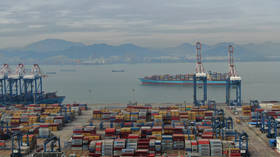EU’s green initiative could de-industrialize Africa – development bank head

An EU plan to impose a carbon tax on imports would cost Africa as much as $25 billion a year, the president of the African Development Bank, Akinwumi Adesina, has warned, adding that the continent should be exempt from the measure.
Under the so-called Carbon Border Adjustment Mechanism (CBAM), which takes effect in 2026, imports of steel, cement, iron, aluminum, fertilizers, electricity, and hydrogen would be taxed if they originate in countries with less stringent carbon emissions rules.
Speaking at the Sustainable Trade Africa Conference on the sidelines of the Cop28 climate change conference in Dubai on Thursday, Adesina argued that the mechanism could significantly constrain the African continent’s trade and progress toward industrialization by penalizing value-added exports.
“With Africa’s energy deficit and reliance mainly on fossil fuels, especially diesel, the implication is that Africa will be forced to export raw commodities again into Europe, which will further cause de-industrialization of Africa. Africa has been short-changed by climate change; now it will be short-changed in global trade,” he stated.
Citing data from the International Renewable Energy Agency, Adesina said that Africa is already being overlooked in the global energy transition and that the carbon tax legislation will only aggravate inequalities between the regions.
“Africa received just $60 billion or 2% of the $3 trillion of global investments in renewable energy in the past two decades, a trend that will now impact negatively on its ability to export competitively into Europe,” Adesina said, calling for what are called Just Trade-for-Energy Transition partnerships, whereby developed nations provide financing to developing countries to make the transition to green energy. He believes such setups would help facilitate Africa’s renewable ambitions without restricting its trade prospects.
He also pointed to a report by Moody’s Analytics showing that Africa had the lowest default rate on investment in infrastructure compared to other parts of the world.
The president of African Export-Import Bank (Afreximbank), Benedict Oramah, has also warned of the risks associated with a rapid de-carbonization program in Africa given the high financial costs.
“Preliminary results of a study recently commissioned by Afreximbank reveal that rapid de-carbonization by fossil fuel-exporting countries in Africa could cut merchandise exports by $150 billion,” he noted.













